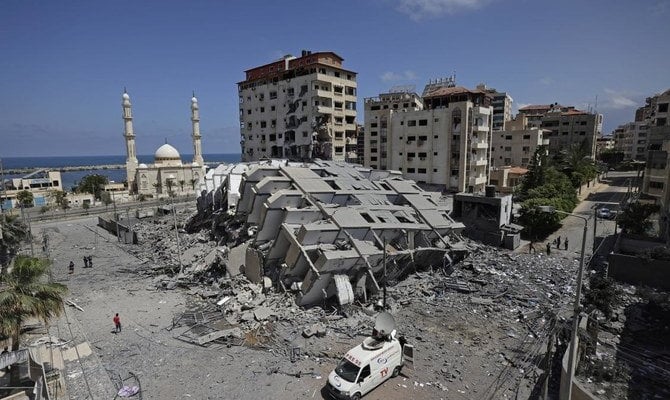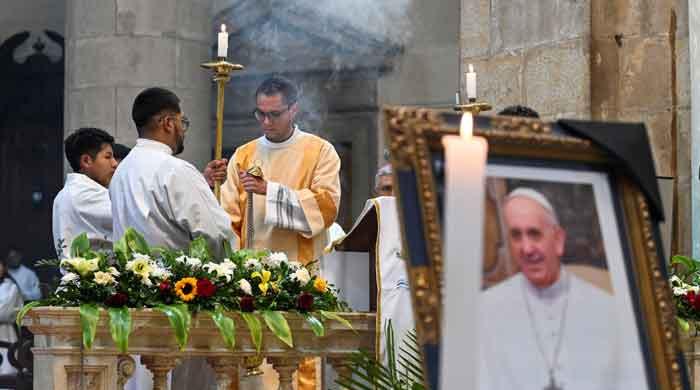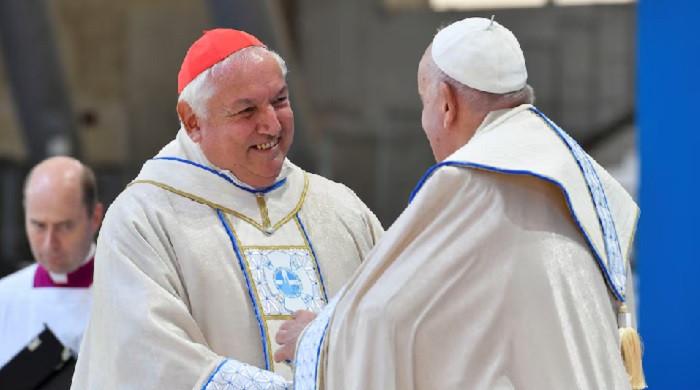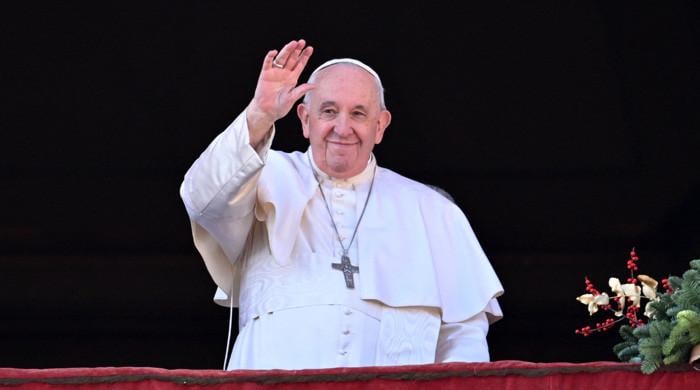Israel continues massacre in Gaza, Palestinian death toll surges to 126
Israel is facing a conflict in the Palestinian territories unlike any in its recent history
May 15, 2021

Israeli fighter jets on Saturday continued to pound central Gaza with bombs, as the death toll of the Palestinians killed in the fighting reached 126, 31 among them children.
Despite intensifying diplomatic efforts to ease five days of fighting between Israel and Palestinians in Gaza, Israel's air force struck several sites in the strip overnight, while rockets again tore towards the Jewish state.
Overall Palestinian fatalities from strikes on Gaza have reached 126 -- including 31 children -- with 950 injured.
Israel, which is also trying to contain an outbreak of internal Jewish-Arab violence, is facing a conflict in the Palestinian territories unlike any in its recent history.
Its bombardment of Gaza began Monday in response to rocket fire towards Jerusalem from Hamas and other Palestinian armed groups in the enclave.
More than 2,000 rockets have been fired at the Jewish state since Monday, killing nine people, including a child and a soldier, with more than 560 people injured.
Israel's response has seen it hit nearly 800 targets, including a massive assault Friday on a Hamas tunnel network dug under civilian areas.
Towers and homes were levelled, forcing Gaza families to seek shelter in schools and mosques, ahead of another possible bombardment.
"All the children are afraid and we are afraid for the children," said Kamal al-Haddad, who fled with his family to a UN-supported school in Gaza City.
Early Saturday, the Israeli army said it had hit a Hamas "operation office" near the centre of Gaza City, with additional overnight strikes targeting what the military called "underground launch sites".
Air raid warnings continued to wail in southern Israel early Saturday.
The fighting in blockaded Gaza, the worst since a 2014 war, exploded following hostilities in east Jerusalem, the Israeli-annexed part of the city Palestinians claim as their capital.
Fresh overnight tensions hit the east Jerusalem area of Shuafat, where young, masked Palestinian protesters set debris on fire as Israeli police responded with tear gas.
West Bank unrest
The West Bank saw fierce fighting on Friday, with the Palestinian health ministry saying 11 people were killed by Israeli fire.
A Palestinian security source said the fighting was the "most intense" since the second intifada, or uprising, that began in 2000.
Violence on Fridays in the West Bank is a traditional facet of the decades-old Israeli-Palestinian conflict, but the latest clashes are closely linked to the events in Jerusalem and Gaza.
From Ramallah to Hebron and across the territory occupied by Israel since 1967, Palestinians hurled stones, Molotov cocktails and other projectiles.
Israeli forces hit back with rubber bullets and, in some instances, live rounds.
"It would be shameful to remain quiet with what´' going on in Gaza," said Oday Hassan, 21, who was protesting in Al-Birah.
The health ministry said more than 150 had been wounded in the West Bank, as it appealed for blood donations.
At the least one of the Palestinians killed was shot dead after attempting to stab a soldier north of Ramallah, said the Israeli army, which early Saturday reported an additional attempted knife attack during "a violent riot" in Nablus.
Mob violence in Israel
Within Israel, an unprecedented wave of mob violence has seen Arabs and Jews savagely beat each other, with both synagogues and mosques set alight.
More than 750 people have been arrested this week, police said.
In one of the most shocking episodes of the intercommunal violence, a far-right Jewish mob beat a man they considered an Arab in Bat Yam, near Tel Aviv on Wednesday, leaving him with serious injuries.
In the north, where Israel remains technically at war with neighbouring Lebanon and Syria, tensions were also rising.
The army said it "fired warning shots towards a number of rioters who crossed from Lebanon into Israeli territory" on Friday, forcing them back into Lebanon.
Israel's arch-enemy, the pro-Iranian group Hezbollah, announced one of its members, 21-year-old Mohamad Kassem Tahan, was killed by the Israeli shots.
Three rockets were later launched at Israel from southern Syria, where Hezbollah is present, but there was no immediate confirmation of a link between the events.
The UN said the Security Council would meet Sunday to address Gaza.
US Secretary for Israel-Palestinian Affairs Hady Amr arrived in Israel on Friday as part of mediation efforts.
Amr will hold talks both with Israeli officials and Palestinian leaders in the West Bank and encourage a "sustainable calm", State Department deputy spokeswoman Jalina Porter said.
But Israel's Prime Minister Benjamin Netanyahu gave no indication that Israel was ready to ease its campaign.
"I said we'd deliver heavy blows to Hamas and other terror groups, and we're doing that," Netanyahu said.
"They're paying and will continue to pay dearly for that. It's not over yet."
Israel estimates that more than 30 leaders of Hamas and its ally Islamic Jihad have been killed.
It has hit sites it describes as military targets such as Hamas bomb-making facilities and the homes of senior militant commanders.
The UN said 10,000 Gazans had been forced from their homes by the bombardment.
Several international airlines cancelled flights amid the Gaza rocket fire, while many incoming flights have been diverted from the main airport near Tel Aviv.











